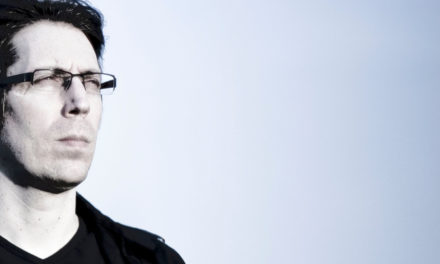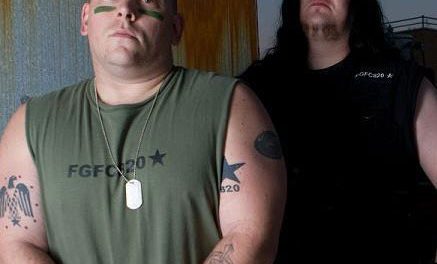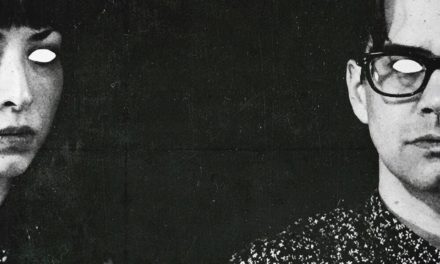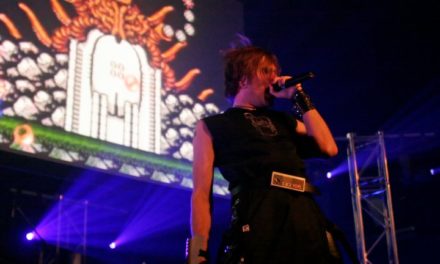Our Outland series of guest posts continues with an interview with Neofolk duo Alsarath conducted by friend of the site Kathleen Chaussé.
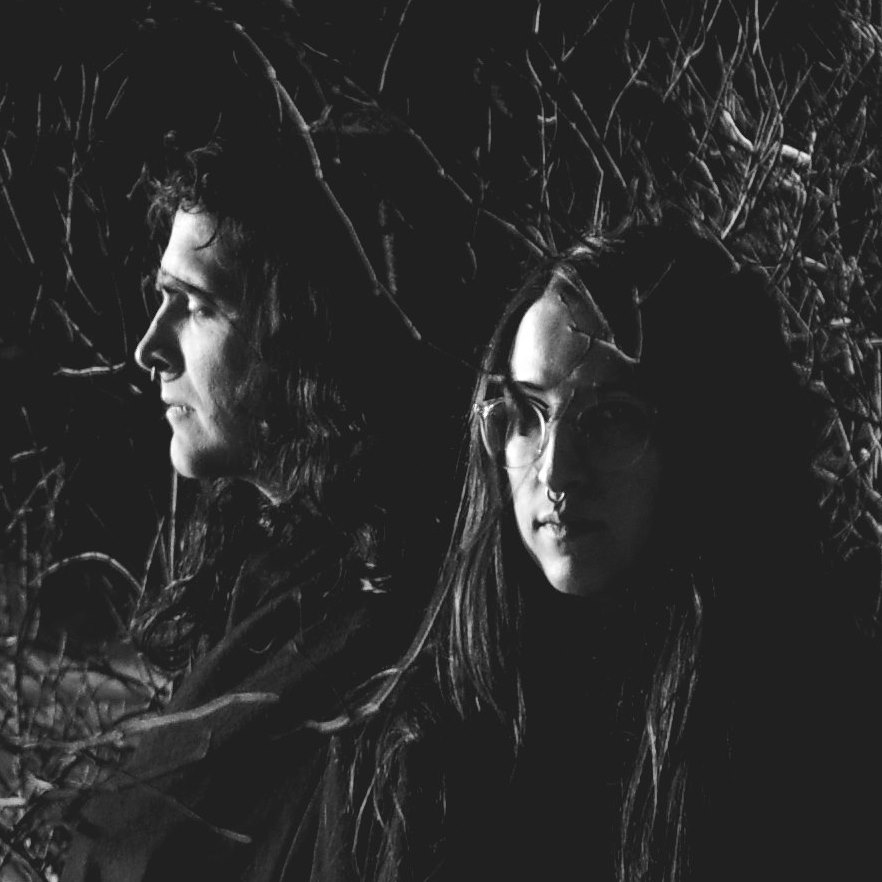
Alsarath is an anti-fascist Neofolk project created by Margaret Kiljoy & Jack Olga. Margaret is located in the Appalachian Mountains, and Jack is in Montreal, Quebec. Since Neofolk has often been associated with problematic messaging, it is refreshing for a project in the genre to be unapologetically anti-fascist. Fortunately, I got a chance to further explore these topics with them.
The hypnotic nature of several of these songs makes them seem like rituals. If they are, what are you hoping to achieve while performing them?
Margaret: The ritual aspect is for sure intentional and something we talk about when we write songs. Each song is going to have a different intent, though. “Witch of Hemlock,” for example, is just a spell against anxiety. We meant it for us, which is why it opens the album and all the sets we’ve played so far.
Jack: I think in some way, each song we write is invoking something, whether it’s something we need to be able to feel (and by extension something we want to offer to anyone listening to us), or whether it’s the spirit of something that’s important to us. We, or at least I, am new at this, so I’m not sure how effective it is, but it’s definitely intentional. You could really broadly consider the four songs on our EP’s spells as follows: against anxiety / use yr wiles / those who came before / resistance. The last one is the one I, personally, invested the most in, and I still find it hard to articulate what it’s about. It’s a refusal to be purified, or to strive for purity, not just as a person but as a collective, because I think there is a way in which sexism, racism, fascism, transphobia, homophobia, ableism, etc., even gentrification, are forces that seek to purify things, or to attain an ideal of purity, and therefore resistance is allowing for, even celebrating, the opposite of that. It’s a spell for seeing the beauty and the vitality in imperfection, imagined as rot, the cycle of life and death and decay. Something like that, anyway.
In this body of work, it seems like you’re crafting a series of spells. Since witchcraft can be a powerful part of a community, which community are you speaking to?
Margaret: That’s hard to answer super directly, I guess. Music has to find its audience…the aesthetics will speak to some people, and work for those people, and not for others. When we started this we really didn’t know if anyone was going to be into this strange marriage of Neofolk and noise at all, but we’re glad it’s resonating with people. So I guess it’s like: these are spells for the people for whom these spells will work.
Of course there’re communities I’m part of and therefore is more likely to find this stuff in the first place. For me that’s anarchist queers in southern Appalachia. Or more broadly the kind of weird anarchist pagan circles that have been cropping up lately.
Jack: We both think of ourselves as perpetual outsiders, so that’s a difficult question to answer! I don’t think either of us intended to aim this project at a particular community– like Margaret said, we weren’t even sure anyone would like it. We just hoped our friends would be kind enough to listen. The spells we’re casting are for us, and I guess, for people like us, people who despise authority, oppose oppression, and believe in magic, people who like things that are beautiful and strange. I’m not sure I can be more specific than that– I’m not sure I’d want to be.
Are your choices of symbolism, such as the use of pine, just as intentional? What helps guide the symbolism you use?
Margaret: Some of the symbols we pick are really conscious (like “when you die your body will never rot”). Others come unbidden. Hemlock became the first Alsarath song and the core of it came to me around Halloween last year. I was driving home to the forest from playing a cover band show with my friends (“Goth Brooks”) and I should have been happy but I wasn’t, and I knew I was going to write a song on harp to invoke “the witch of hemlock” but I didn’t know why until later. I remember, right before I sang the line “I call thee, witch of hemlock” I was like wait, do I? and I stopped song writing to look up the symbolism there. hemlock is a pretty intense thing to call in. so “pine” came in as a counterpoint. hemlock is poisonous and was used to calm tremors and seizures, which is why that song is a kind of mournful cry for calm, a spell against anxiety.
The song still didn’t mean anything, not really, until Jack built on it and we were able to talk through its meanings and symbols. We settled on more of that, cliché as it is, walking through the graveyard at sleepy hollow.
Jack: As with so many parts of this project, a lot of the symbols come from Margaret’s dreams, so if they’re intentional, it’s through layers of dream logic. If a symbol comes that way, we research it and talk about it to make sure that it’s saying what we want it to say, or that we’re writing what it means. The heron came this way, too — Margaret wrote the line, “I looked into the eyes of the heron” and then we spent several days trying to figure out what that meant and why it was something you shouldn’t do. It was only later that we discovered that there is an Ursula Le Guin story called “The Eye of the Heron,” where herons are an alien species that the protagonists of the story encounter during moments of significant introspection when they’re considering the alien/other in relation to themselves. That’s powerful magic, you know? It feels like we (Margaret) really tapped into something. She’s definitely the more magical of the two of us. It’s an honour to be part of that.
You each make music apart from each other, both solo and in bands. What do you find the other person brings to Alsarath that sets it apart from other projects?
Margaret: Jack has impeccable taste. They know how to filter raw ideas and turn them into something better. They also have a stronger sense than me of what they want to say and what is worth saying. I tend to just show up with raw ideas and I rely on jack to help turn them into things worth saying, songs worth singing.
They’ve also got a hell of a voice, whether clean or harsh, and a good sense for writing melodies. They show up strong pretty much everywhere I’m weak. It’s fantastic to write with them.
Jack: Margaret is a literal endless wellspring of raw creativity and stories, coupled with the drive to create and the motivation to deep-dive into the how of making things. I am much more of a perfectionist, it takes me forever to come up with anything. So, in a sense, it’s the perfect pairing – Margaret comes up with the ideas and then I help shape them into songs. We talk a lot about how creativity, magic, things like that, are this intentional foray into unreality, and Margaret traverses that terrain so naturally. I’m the anchor.
It’s also interesting that you bring up our other projects— my noise project, Alekto, is something I’ve been thinking about for around eight years, but I could never bring it into being until Margaret and I started Alsarath. In so many ways, it took her voice for me to find mine.
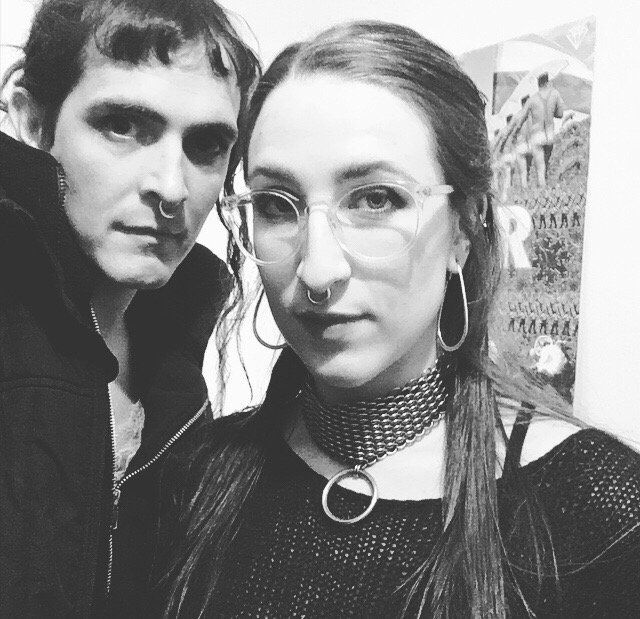
With one member in Montreal and the other in North Carolina, how do you manage a successful working relationship despite the physical distance between you?
Jack: One could argue that we don’t! When we’re in the same place, writing is almost effortless, we kind of can’t help but bat ideas back and forth between us. It’s been incredibly difficult to write new music since we finished our EP and Margaret went back to North Carolina. This is partially because I am pretty new to writing music and just don’t really have the hang of it yet— and it’s partially because of the pandemic, which has been so disruptive for everyone’s creativity and ability to work on projects. I do frontline work at a homeless shelter, which has been exhausting. I can say that I am trying very hard to carve out space for writing.
Having organized a fundraiser for First Nations people, do you find it important for artists to be involved in helping communities in need?
Jack: I mean, the short answer is yes. The somewhat longer answer is that I think it is every person’s responsibility to listen and respond to the needs of other people insofar as they’re able, and I think that responsibility increases the more privilege a person has, and also the more of a platform they have. Artists have a platform (at least theoretically, you know), therefore, it’s incumbent on us to pay attention to what’s going on, listen to what people are asking for, and respond accordingly.
What are you working on looking forward with the project?
Margaret: I’m looking forward to the border opening (or the US collapsing, I suppose) so that we can work together in person again soon and write a full length. We’re both bursting with ideas and emotions that need to be translated into music.
I’m looking forward to when we can play shows and tour, but I also recognize that if we’re going to be coming together in large groups right now, during a pandemic, it should be to dismantle oppressive systems and challenge the power of the colonial state.
Jack: I’m looking forward to being able to work on music in person together again, and to playing around with all the instruments Margaret has been building as a pandemic hobby. I’m also very much looking forward to touring with this project. We had all kinds of schemes in mind that have been indefinitely put on hold, but, you know, someday.
Alsarath’s Come To Daggers is out now on Bandcamp.

